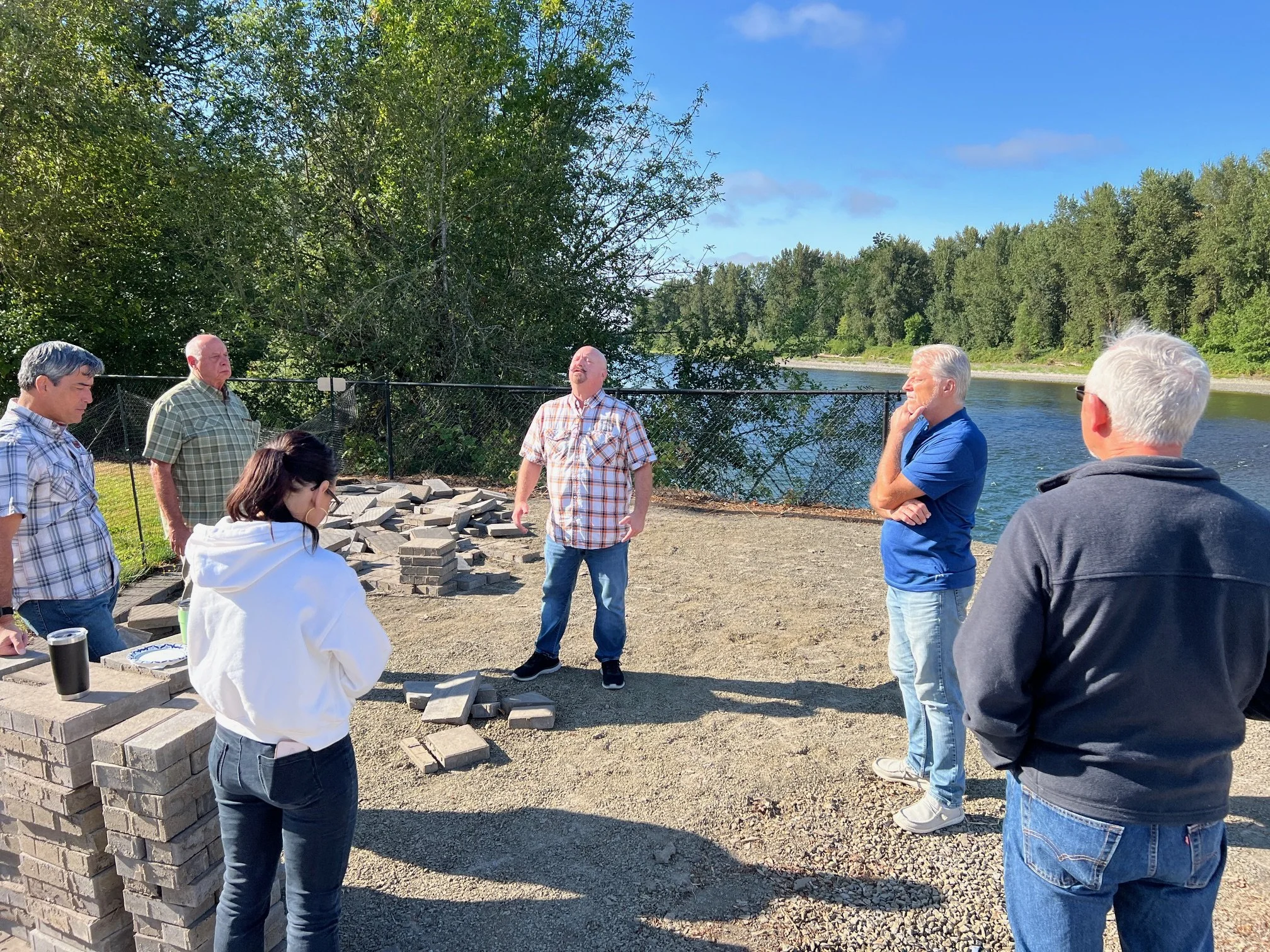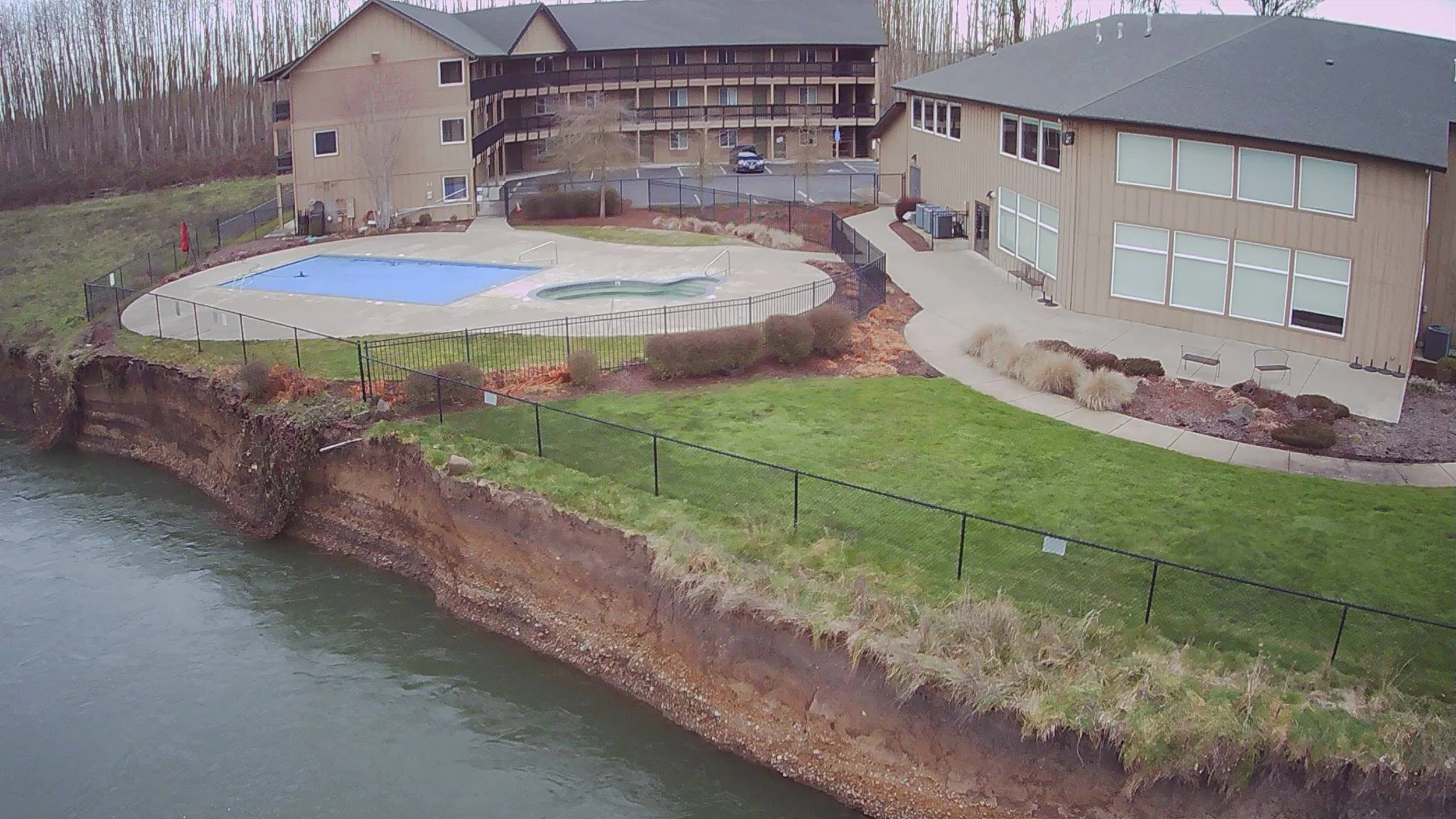Riverbank Prayer Points and Information
“I lift up my eyes to the hills. From where does my help come? My help comes from the Lord, who made heaven and earth.” Psalms 121:1-2
PRAYER POINTS FOR THE RIVERBANK PROJECT
1. Wisdom and Clarity
- Ask for wisdom in contingency planning and timing decisions.
2. Favor with Agencies and Approvals
- Ask for open doors and favor with agencies such as the Army Corps, DSL, DEQ, DLCD, and county officials for phase 2.
- Pray that necessary permits and approvals would be expedited for phase 2.
3. Provision and Funding
- Lift up the financial need, especially the OWEB grant application and other funding opportunities.
- OWEB grant would be approved in a timely manner.
4. Protection Over the Property
- Ask for God’s protection over the riverbank and the structures that will be at risk during the coming winter.
- Pray against erosion, flooding, or structural damage.
5. Peace and Trust
- Above all, pray for peace—trusting that God is sovereign over every delay, challenge, and outcome.
- Ask for faith to believe that He will make a way, even when doors appear closed.
“Restore us, O God; let your face shine, that we may be saved!” Psalm 80:3
2024
2025
Form Letter/example you can use while contacting our Federal and State leaders.
[Your Name]
[Your Title/Role, if applicable]
[Church Name]
[Church Address]
[City, State, ZIP Code]
[Email Address]
[Phone Number]
[Date]
The Honorable XXXXXXXXXX
Street 1
Street 2
City, State Zip Code
Dear XXXXXXXXXX,
I am writing on behalf of Life Bible Church, located on the banks of the Willamette River in Harrisburg, OR to respectfully request your support in securing funding to address significant erosion affecting our riverbank.
Our church has served this community for 24 years, not only as a place of worship but also as a gathering space for outreach, support programs, and local events. Unfortunately, ongoing erosion along the Willamette’s edge is posing an increasing threat to our property, nearby infrastructure, and the safety of our congregation and visitors.
The situation is worsening with seasonal flooding and more frequent extreme weather events. We are deeply concerned about the long-term stability of the land and the potential loss of access and safety for our church and the surrounding area. In addition to property damage, this erosion contributes to ecological degradation, affecting water quality and local wildlife habitats.
While we are exploring local and private solutions, the scale and cost of proper remediation exceed our current capacity. We urgently need state-level assistance to fund and implement erosion control measures such as riverbank stabilization, restoration of native vegetation, and possibly engineered reinforcements.
XXXXXXXXXX, your leadership in environmental stewardship and community resilience, is greatly appreciated. We respectfully ask that your office explore ways to support remediation efforts along the Willamette River, particularly for vulnerable community institutions like ours that serve the public in many capacities.
Thank you for your attention to this important matter. We would welcome the opportunity to provide more details or host a site visit to illustrate the urgency of the situation.
Sincerely,
[Your Name]
[Your Title/Role, if applicable]
[Church Name].
Federal and Oregon Rep Leadership
President Donald J Trump
White House Phone: 202-456-1111
White House Address:
The White House
Office of the President
1600 Pennsylvania Avenue, N.W.
Washington, DC 20500
Email: President Donald J Trump
Vice President JD Vance
White House Phone: 202-456-1111
White House Address:
The White House
Office of the Vice President
1600 Pennsylvania Avenue, N.W.
Washington, DC 20500
Email: Vice President JD Vance
Speaker Of The House
US Senator Mike Johnson
Phone: 202-225-2777
Addrerss: 521 Cannon House Office Building Washington, DC 20515
Email: Speaker Mike Johnson
Oregon Senator Ron Wyden
Phone: (202) 224-5244
Address: 221 Dirksen Senate Office Building Washington DC 20510
Email: Senator Ron Wyden
Oregon Senator Jeff Merkley
Phone: 202-224-3753
Address: 531 Hart Senate Office Building Washington DC 20510
Email: Senator Jeff Merkley
Speaker Of The House
Oregon House Representative Suzanne Bonamici
Phone: 202-225-0855
Address: 403 Cannon House Office Building Washington,DC 20515
Email: Rep Suzanne Bonamici
Oregon House Representative Cliff Bentz
Phone: 202-225-6730
Address: 409 Cannon House Office Building Washington,DC 20515
Email: Rep Cliff Bentz
Oregon House Representative Maxine Dexter
Phone: 202-225-4811
Address: 1207 Longworth House Office Building Washington,DC 20515
Email: Rep Maxine Dexter
Oregon House Representative Val Hoyle
Phone: 202-225-6416
Address: 1620 Longworth House Office Building Washington, DC 20515
Email: Rep Val Hoyle
Oregon House Representative Janelle Bynum
Phone: 202-225-5711
Address: 1508 Longworth House Office Building Washington,DC 20515
Email: Rep Janelle Bynum
Oregon House Representative Andrea Salinas
Phone: 202-225-5643
Address: 403 Cannon House Office Building, Washington, DC 20515
Email: Rep Andrea Salinas
State House Leaders
Speaker of the House Representative Julie Fahey
Capitol Phone: 503-986-1414
Capitol Address: 900 Court St. NE, H-271, Salem, Oregon 97301
Email: Rep.JulieFahey@oregonlegislature.gov
Speaker Pro Tempore David Gomberg
Capitol Phone: 503-986-1410
Capitol Address: 900 Court St. NE, H-480, Salem, Oregon 97301
Email: Rep.DavidGomberg@oregonlegislature.gov
House Republican Leader Christine Drazen
Capitol Phone: 503-986-1400
Capitol Address: 900 Court St. NE, H-395, Salem, Oregon 97301
Email: Rep.ChristineDrazan@OregonLegislature.gov
House Majority Leader Representative Ben Bowman
Capitol Phone: 503-986-1425
Capitol Address: 900 Court St. NE, H-295, Salem, Oregon 97301
Email: Rep.BenBowman@oregonlegislature.gov
Representative - Jami Cate
Republican - District 11 - Linn
Capitol Phone: 503-986-1411
Capitol Address: 900 Court St. NE, H-38, Salem, Oregon 97301
Email: Rep.JamiCate@oregonlegislature.gov
State Senate Leaders
Senate President Rob Wagner
Capitol Phone: 503-986-1600
Capitol Address: 900 Court St. NE, S-201, Salem, Oregon 97301
Email: Sen.RobWagner@oregonlegislature.gov
Senate Pro Tempore James I. Manning, Jr.
Capitol Phone: 503-986-1707
Capitol Address: 900 Court St. NE, S-213, Salem, Oregon 97301
Email: Sen.JamesManning@oregonlegislature.gov
Senate Dem Leader Kayse Jama
Capitol Phone: 503-986-1724
Capitol Address: 900 Court St. NE, S-223, Salem, Oregon 97301
Email: Sen.KayseJama@oregonlegislature.gov
Senate Republican Leader Bruce Starr
Capitol Phone: 503-986-1712
Capitol Address: 900 Court St. NE, S-303, Salem, Oregon 97301
Email:Sen.BruceStarr@oregonlegislature.gov
Senator Cedric Hayden
District: 6
Capitol Phone: 503-986-1706
Capitol Address: 900 Court St NE, S-315, Salem, OR, 97301
Email: Sen.CedricHayden@oregonlegislature.gov
Tips on Communicating with Government Officials via Mail or Email
Here are some tips from the University of California Berkeley Library on contacting and communicating with your elected official through letters or e-mail:
Be Original: Consider writing your own original correspondence. While many organizations can provide you a pre-written letter or postcard that you simply sign, many legislators consider a thoughtful, original letter from a constituent worth 1000 of the pre-written letters. Feel free to use a pre-written letter as a base to rework with your own words.
Stay Brief: Government officials are usually very busy. The maximum length of a letter/e-mail should be one page. Keep in mind that the letter will probably be read by a legislative aid, so a brief letter is best.
State Who You Are and What You Are Writing About: Identify yourself as a constituent and why you are writing in the first place first paragraph. This will keep your letter brief. However, refrain from using lines such as "As a citizen and a taxpayer..." and never make a threat. Also, if you know the bill name or number state it in the first paragraph.
Personalize Your Letter/E-mail: If the legislation you are writing about will affect you personally, tell the legislator about it. Write a brief personal story about what the legislation will/will not do for you and/or your community.
Personalize Your Relationship: The more you can personalize your relationship with the legislator, the stronger your letter/e-mail will be. If you worked on his/her campaign or donated money to the legislator or their party, say so. If you ever met the legislator, briefly mention this in your letter.
Three Points: In keeping your correspondence short, consider making no more than three main points. Flush out your three strongest points and stick with them.
Be Respectful: Taking a firm position on an issue is fine, but opening correspondence with "Dear Idiot" will probably get your letter sent straight to the garbage. Do not use profanity. Even if your legislator is not the person you voted for, remember to be respectful.
Include Your Address in Your Signature, Even in E-mail: Legislators are busy people, and you should never demand a response. However, some legislators will take the time to write back, but they cannot if you do not include your address. Including your address also affirms the fact that you are a constituent.
Proper Address: Below are the ways to address your letters:
Dear Mr. President:
Dear Mr. Vice President:
To The Honorable Senator [Name]:
To The Honorable Representative [Name]:
Follow up: After you have contacted your elected official, follow up on what they did. If he/she voted the way you wanted, consider contacting them to thank him/her. If your legislator did not vote the way you wanted, consider contacting them and respectfully express your disappointment. In any follow-up letter/email, mention the fact that you wrote him/her before the vote was taken.
Tips for Writing Effective Letters to Congress
Here are some tips from ThoughtCo. writer Robert Longley that will help you write a letter to Congress that has an impact.
Do's...
Your legislators like to hear opinions from home and want to be kept informed of conditions in the district. Base your letter on your own experiences and observations.
If writing about a specific bill, describe it by number or its popular name. Your legislators have thousands of bills before them in the course of a year, and cannot always take time to figure out which one you are referring to.
They appreciate intelligent, well-thought-out letters that present a definite position.
Even more important and valuable to them is a concrete statement of the reasons for your position--particularly if you are writing about a field in which you have specialized knowledge. Representatives have to vote on many matters with which they have had little or no first-hand experience. Some of the most valuable information they receive comes from facts presented in letters from people who have knowledge in the field.
Short letters are almost always best. Members of Congress receive many letters each day, and a long one may not get as prompt a reading as a brief statement.
Letters should be timed to arrive while the issue is alive. Members of the committee considering the bill will appreciate having your views while the bill is ripe for study and action.
Remember to follow through with a thank-you letter.
Don'ts...
Letters that demand votes for or against a certain bill without giving any reasoning are not very influential.
Threats of defeat at the next election are not effective.
Boasts of how influential the writer is are not helpful.
Do not ask for a vote commitment on a particular bill before the committee in charge of the subject has had a chance to hear the evidence and make its report.
Form letters or letters that include excerpts from other letters on the same subject are not as influential as a simple letter drawing on your own experience.
Congressional courtesy requires legislators to refer letters from non-constituents to the proper offices, so you should generally confine your letter-writing to members of your state's delegation or members of the committee specifically considering a bill.
Do not engage in letter writing overkill. Quality, not quantity, is what counts.







